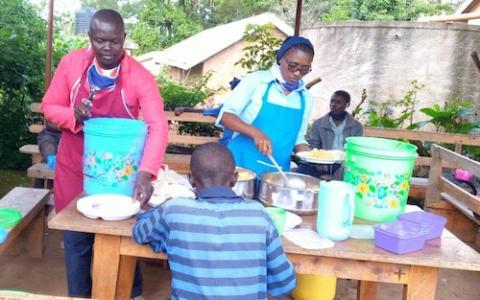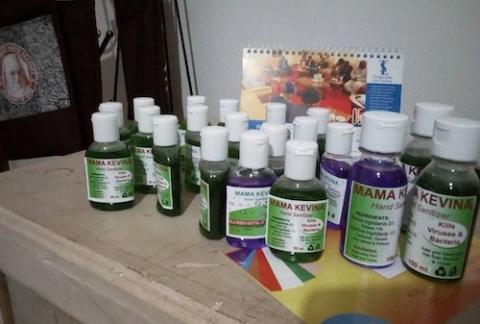
A group of Little Sisters of St. Francis learn about various ways of protecting themselves from COVID-19. (Association of Consecrated Women in Eastern and Central Africa)
Editor's note: As part of our Coronavirus: One Year Later coverage, we invited leaders of women's congregational associations to reflect on how the pandemic has affected religious life in their regions. Some provided overviews; others focused on their individual congregations as emblematic of shared experience. This entry is from the Association of Consecrated Women in Eastern and Central Africa (ACWECA), which includes national associations of sisters from Eritrea, Ethiopia, Kenya, Malawi, Sudan, South Sudan, Tanzania, Uganda, Zambia and Zimbabwe.

(NCR, GSR logo/Toni-Ann Ortiz)
The COVID-19 pandemic has been a challenge to the mission of religious women in the 10-country region of the Association of Consecrated Women in Eastern and Central Africa (ACWECA). It impacted the sisters' ministries, their finances and the physical health of the members. The elderly and the sick were more vulnerable and required special treatment.
On the other hand, the pandemic helped different congregations to come up with new ways of evangelization. Prayer among sisters in the region dominated; they prayed for the affected and infected people as well as their congregations' ministries. Some congregations went on to use their own resources to reach out to the most vulnerable communities in their countries, providing food, sanitizers, hand washing facilities and face masks, among other needs. Others solicited funding from donor groups to advance their ministries in the midst of the pandemic.
Sisters used the media — radio, television and social media — to share information on preventive measures to COVID-19, educating people, particularly in rural areas who do not have access to COVID-19 information. They printed posters with information on how to protect oneself and others, and are guiding parents on how to support learning of their children at home. In addition, communities were sensitized on how to support people with disabilities during this time.
While protecting themselves, sisters in the region were encouraged to come up with innovative ways of addressing issues emerging from the coronavirus pandemic. Some conferences' staff were working from home, with a number of them taking on virtual meetings through webinars. The message from the ACWECA leadership was to encourage them to observe the preventive protocols put in place by their governments to stave off the pandemic as infection figures were continuing to rise on the continent.
Advertisement
From the reports received by the ACWECA secretariat, individual congregations/conferences in the region became part of the solution in helping communities to stay safe. The sisters ensured that they observe the protocols set up by their governments — like wearing face masks, washing hands with soap, observing social distancing rules, etc.
Sisters became more innovative in their ministries. Sr. Astrida Banda of Zambia, for example, produced a live radio show on COVID-19 awareness. English is an official language in Zambia, but most people don't understand it. About 70 languages are spoken, so sisters from six congregations teamed up to take the message of COVID-19 to local people using different languages on the radio. Sr. Banda and her team coordinated radio shows about the virus, its transmission and how to stay safe, as well as answered coronavirus related questions. TVs are not available in many families, but radios have an audience that is in most cases left behind.
In Kenya, sisters responded to COVID-19 in different ways. They continued to distribute food among people in unofficial settlements who were under lockdown. In one of the congregations located next to the slum, a sister was given a responsibility of making masks on a full time basis; these were distributed to people who needed them.
Sr. Winnie Mutuku, a Kenyan nun and a member of the Daughters of Charity of St. Vincent de Paul, won a state award from the Kenyan president for feeding children who live on the streets amid the COVID-19 pandemic.

Sr. Astridah Banda, a Dominican Missionary Sister of the Sacred Heart of Jesus, prepares to deliver her COVID-19 radio program. (Courtesy of Astridah Banda)
In Tanzania, Sisters of Our Lady of Good Counsel worked with deaf people to empower them on sharing information about COVID-19 with fellow deaf people using sign language. Sisters here realized that this group was left behind on accessing information and preventive measures about COVID-19. They also presented various radio programs on different radio stations to help people cope well psychologically with COVID-19. They worked with government leaders in the area to sensitize the community about the pandemic. They prepared brochures with information on psychological health during COVID-19 and shared them with people; they also worked with the Catholic Church by using their YouTube channel to present a series of sessions on COVID-19.
Little Sisters of St. Francis produced hand sanitizers named after their founder, Mother Kevin, and distributed them to people in the community.
In Ethiopia, different congregations participated in an awareness campaign. Some provided their facilities, such as school halls and hospitals to be used as centers for infected people. Sisters working in clinics and hospitals continued to care for those infected. They made masks for needy people, and some congregations offered transportation to COVID-19 testing facilities and health centers.

Sr. Winnie Mutuku, of the Daughters of Charity of St. Vincent De Paul in Kenya, shares food with children who live on the streets amid the COVID-19 pandemic. (Courtesy of Winnie Mutuku)
Malawian sisters were given 30 minutes on radio to present issues on the prevention of coronavirus infection. They were given time in church as well to talk to people on the pandemic. They worked with the health ministry to educate people on the disease, and by May 20 last year, had reached 2,344 people through chiefs and community leaders. In the Strengthening the Capacity of Religious Women in Early Childhood Development (SCORE-ECD) space, they installed health facilities. Since most people use boreholes for water, sisters placed sanitizers and posters in those locations so that when people come for water, they may also be educated on health issues.
Lessons learned
- The pandemic has been a reminder of basic hygiene observances. Many people in the region are not able to observe some protocols aimed at keeping the virus at bay. For them, simple rules like hand washing may not work because they lack access to water and/or are not able to afford soap to ensure proper hand washing at all times.
- People with disabilities are sometimes neglected. Preparation and use of video clips with information on COVID-19 with sign language should be initiated and continued.
- A project of Strengthening the Capacity of Religious Women in Early Childhood Development (SCORE-ECD) is able to reach people, particularly those in remote areas where the sisters serve. This program however, is only available in three countries: Kenya, Malawi and Zambia. The program aims at educating mothers through the sisters. SCORE ECD messages emphasize hygiene. Mothers are taught to wash their hands after touching animals, before preparing food and before and after breastfeeding, and to have hand washing stations to prevent waterborne diseases and create lifelong hygiene habits. During the pandemic, hand washing is emphasized. For families who already have mastered these kind of hygiene habits, it was easier to adopt the same practices during the pandemic. If extended to other countries, pandemics like this one could be better handled by the sisters.
- Sisters work with youth, children and women. Programs to instill in young mothers and children methods of keeping clean and safe and making it a practice would be very helpful.
- Most sisters' technological skills are still very limited. As a result, a pandemic like this cripples them and their ministries. It is important for sisters to be more competent in different types of technologies to reach more people, attend relevant webinars and educate others.
- There is life after the pandemic. Congregations have to prepare their sisters by imparting them with technical and technological skills. The sisters in turn will use the knowledge and skills for effective ministry among people, particularly the youth and young adults.
Religious women in the region have indeed demonstrated that in spite of the threat caused by the COVID-19 pandemic, their ministries still thrived. They were resilient and innovative in carrying out their ministries. They reached out to people from all walks of life. In many ways, the COVID-19 pandemic has been a wake-up call to all sisters in the region on how their ministries could be expanded.

Bottles of hand sanitizers produced by the Little Sisters of St. Francis in Tanzania are named after their founder, Mother Kevin and were shared with needy people around them. (Courtesy of Little Sisters of St. Francis)
Emergencies like COVID-19 inform religious women to always be vigilant and prepared to serve. It is also the right time for congregational leadership to rethink about sisters' health-related needs and their sustainability. Since most sisters' ministries are in education and health sectors, there was meagre income to sustain their communities.
The pandemic has brought more poverty in our congregations. During the pandemic, some sisters did not get salaries, or they only received half salaries. Therefore, central administrations had to find ways to sustain their members. All in all, expenditures were minimized in many different ways. In some congregations, new missions that involved traveling were put on hold, holidays were cancelled, sisters were engaged more in agriculture and used what they produced rather than buying. Some whose schools were closed engaged in other existing projects or established more projects that could sustain their congregations in the future.
This pandemic reminds all congregations in the region of the importance of creating ways to sustain their members and their ministries in similar circumstances, but always to be guided by their charism and mission.

ACWECA Secretariat staff unloads food to be distributed to those whose livelihoods are affected by the COVID-19 pandemic. (Association of Consecrated Women in Eastern and Central Africa)






